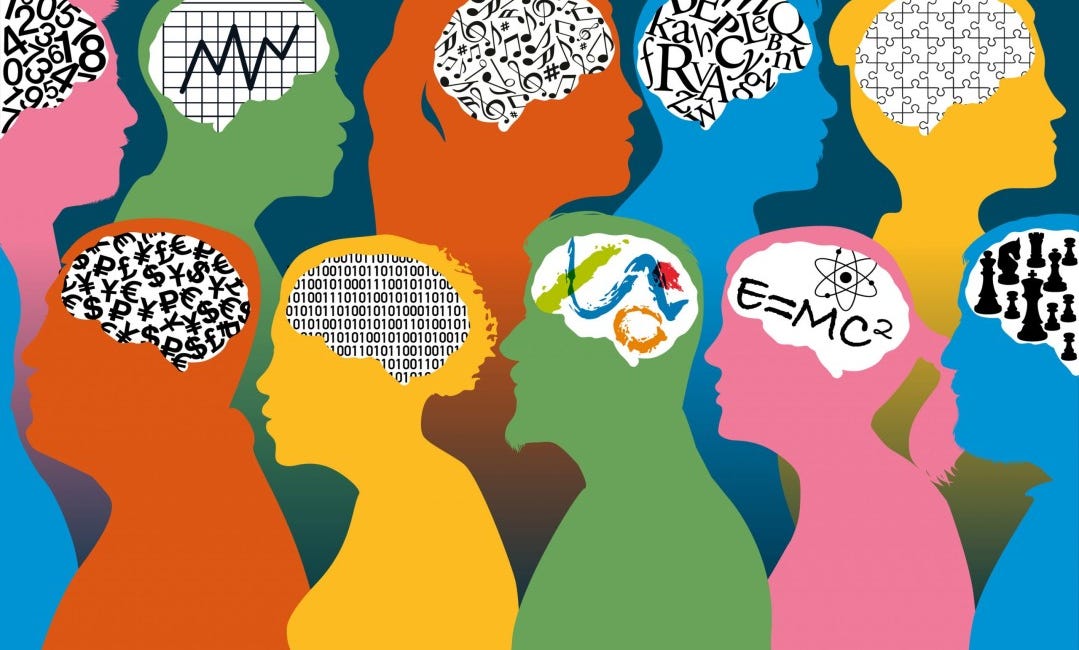What is Neurodiversity?
And is it a disability?
Welcome to Mostly Unlearning, a newsletter that amplifies accessibility, inclusion and disability voices towards more impactful commercial and human outcomes.
In today's edition, I’ll share the context that helped me support a friend through autistic burnout. It’s a follow-up to last week's edition on autistic burnout and how it's different to neurotypical burnout.
Autistic Burnout
Welcome to Mostly Unlearning, a newsletter that amplifies accessibility, inclusion and disability voices towards more impactful commercial and human outcomes.
In late 2023, I supported a close friend through autistic burnout. While I had an academic understanding of autism and burnout, at that moment, it felt like none of that mattered when confronted with real life. In a matter of weeks, they had deteriorated to the point of panic attacks and time off work. Here are some resources that helped me understand autism, neurodiversity, burnout and how to help them.
What is Neurodiversity? And is it a disability?
Autism is a form of neurodiversity. Let’s first define these two terms.
Neurodiversity (and neurotypical)
Neurodiversity refers to the natural variation in human neurological structure and function, encompassing differences in brain development, cognition, and behaviour. It is an umbrella term for this variation and conditions or diagnoses, which are considered variations.
Dr Judy Singer coined the term neurodiversity as a political and human term. She'd found that there is no typical brain; neurodiverse is a spectrum of how unique and individual all of our brains are.
“‘Neuro’ was a reference to the rise of neuroscience. ‘Diversity’ is a political term; it originated with the black American civil rights movement. ‘Biodiversity’ is really a political term, too. As a word, ‘neurodiversity’ describes the whole of humanity. But the neurodiversity movement is a political movement for people who want their human rights.” - Dr Judy Singer
In a work setting, I observe this to be a comparative term to neurotypical. ChatGPT tells me Neurotypical is considered typical or within the usual range of human variation. I prefer not to presume one is better or worse, so it might be better to understand neurotypical as simply not neurodivergent.
Examples of neurodivergence include
Autism Spectrum Disorder (ASD)
Attention Deficit Hyperactivity Disorder (ADHD)
Dyslexia
Dyscalculia
Dyspraxia (Developmental Coordination Disorder)
Tourette Syndrome
Obsessive-Compulsive Disorder (OCD)
Bipolar Disorder
Schizophrenia
Borderline Personality Disorder (BPD)
Post-Traumatic Stress Disorder (PTSD)
Complex Post-Traumatic Stress Disorder (PTSD)
Anxiety Disorders (Generalized Anxiety Disorder, Social Anxiety Disorder, Panic Disorder)
Depression
Oppositional Defiant Disorder (ODD)
Auditory Processing Disorder
Visual Processing Disorder
Selective Mutism
Gender Dysphoria
Pathological Demand Avoidance (PDA)
and even Substance Use Disorders (including addiction)
Autism or Autism Spectrum Disorder (ASD)
Autism is most commonly associated with neurodivergent. It is a neurodevelopmental variation characterised by a unique cognitive profile and sensory experiences. It encompasses a broad spectrum of strengths, challenges, and individual differences, with each autistic person having their own distinct personality, interests, and abilities.
Autism is not a pathology to be cured but a natural aspect of human diversity deserving of acceptance, understanding, and support.
So why refer to it as a disability?
If all of this is normal, expected human variations then why refer to it as a disability? This is a hotly debated topic and here's my take. I refer to neurodiversity as a disability for two reasons.
One, under the social model of disability, society has disabled some neurodiverse people, their expressions and traits.
Two, because they are covered under disability legislation, and I think it's important for people to know their rights.
As I said in an earlier edition of Mostly Unlearning on LinkedIn titled "Are you disabled? Maybe. Are you discriminating? Probably."
"Discrimination is the act or feeling of being treated differently. Disability can be subjective to the person. Even then, both discrimination and disability can undulate with circumstance and time. An individual's relationship with disability and feelings of discrimination is theirs."
"I’ve come to realise it is essential to know your rights and that the law happens to have the term disability in it."
Hold the term disability lightly and your rights tightly.
Consider unlearning
What a disability is and isnt
Why people might resist neurodiversity as a disability
How to access supports
Join the unlearning.
You can subscribe to learn with me. I'll share what I learn (and unlearn) about accessibility, inclusion and disability. Together, we will consider the implications for impactful commercial and human outcomes.



Thank you for sharing this. As someone with autism, I often struggle explaining the neurodivergence and disability nuance. I love going back and reading the theory.
I have found it helpful to frame things this way:
Many people have impairments, things that impact their way of navigating life and require them to do things differently than others. When those people are forced to exist within a society that restricts or devalues the adaptations those folks use to navigate their environment it can be disabling to those who are impaired.
In this way we separate that which is often an intrinsic piece of identity— people are autistic for example— from the cause of disability (social and systematic limitations that become barriers to inclusion in significant ways). This is helpful because it both allows us to acknowledge that disability is a very real experience being navigated by millions of people (an acknowledgement critical to accessing aid for adaptation in many cases) and also it allows us to recognize that the barrier is not intrinsic and not reflective of the individual’s worth or value to the broader society.
For those curious about this differentiation I’d joyfully suggest looking into disability advocacy from a non-western lens as other cultures don’t all interact with what we think of as ‘disability’ in the same way Americans do.